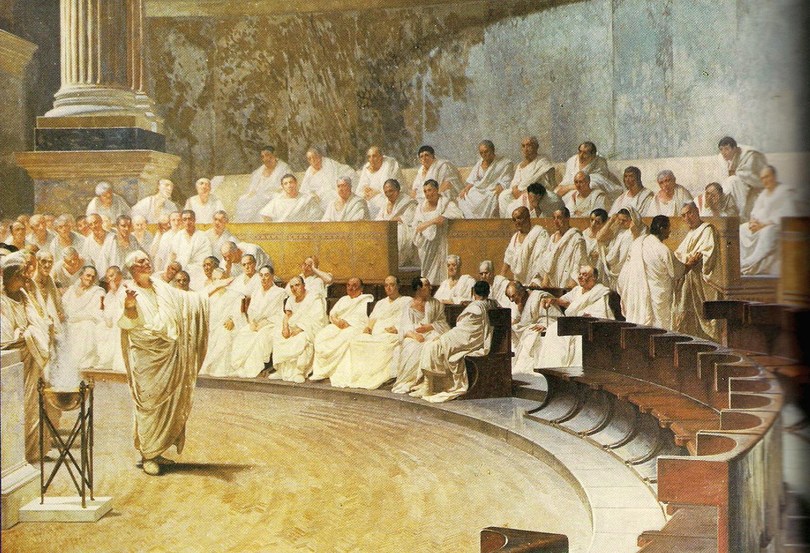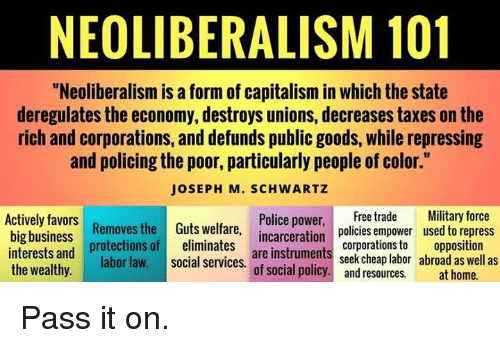The Shocking Paper Predicting the End of Democracy [in the USA]
ANGLO AMERICA, 16 Sep 2019
Rick Shenkman | Politico – TRANSCEND Media Service
Human brains aren’t built for self-rule, says Shawn Rosenberg. That’s more evident than ever.
8 Sep 2019 – Everything was unfolding as it usually does. The academics who gathered in Lisbon this summer for the International Society of Political Psychologists’ annual meeting had been politely listening for four days, nodding along as their peers took to the podium and delivered papers on everything from the explosion in conspiracy theories to the rise of authoritarianism.
Then, the mood changed. As one of the lions of the profession, 68-year-old Shawn Rosenberg, began delivering his paper, people in the crowd of about a hundred started shifting in their seats. They loudly whispered objections to their friends. Three women seated next to me near the back row grew so loud and heated I had difficulty hearing for a moment what Rosenberg was saying.
What caused the stir? Rosenberg, a professor at UC Irvine, was challenging a core assumption about America and the West. His theory? Democracy is devouring itself—his phrase — and it won’t last.
As much as President Donald Trump’s liberal critics might want to lay America’s ills at his door, Rosenberg says the president is not the cause of democracy’s fall—even if Trump’s successful anti-immigrant populist campaign may have been a symptom of democracy’s decline.
We’re to blame, said Rosenberg. As in “we the people.”
Democracy is hard work. And as society’s “elites”—experts and public figures who help those around them navigate the heavy responsibilities that come with self-rule—have increasingly been sidelined, citizens have proved ill equipped cognitively and emotionally to run a well-functioning democracy. As a consequence, the center has collapsed and millions of frustrated and angst-filled voters have turned in desperation to right-wing populists.
His prediction? “In well-established democracies like the United States, democratic governance will continue its inexorable decline and will eventually fail.”
The last half of the 20th century was the golden age of democracy. In 1945, according to one survey, there were just 12 democracies in the entire world. By the end of the century there were 87. But then came the great reversal: In the second decade of the 21st century, the shift to democracy rather suddenly and ominously stopped—and reversed.
Right-wing populist politicians have taken power or threatened to in Poland, Hungary, France, Britain, Italy, Brazil and the United States. As Rosenberg notes, “by some metrics, the right wing populist share of the popular vote in Europe overall has more than tripled from 4% in 1998 to approximately 13% in 2018.” In Germany, the right-wing populist vote increased even after the end of the Great Recession and after an influx of immigrants entering the country subsided.
A brief three decades after some had heralded the “end of history” it’s possible that it’s democracy that’s nearing the end. And it’s not just populist rabble-rousers who are saying this. So is one of the establishment’s pioneer social scientists, who’s daring to actually predict the end of democracy as we know it.
Rosenberg, who earned degrees at Yale, Oxford and Harvard, may be the social scientist for our time if events play out as he suggests they will. His theory is that over the next few decades, the number of large Western-style democracies around the globe will continue to shrink, and those that remain will become shells of themselves. Taking democracy’s place, Rosenberg says, will be right-wing populist governments that offer voters simple answers to complicated questions.
And therein lies the core of his argument: Democracy is hard work and requires a lot from those who participate in it. It requires people to respect those with different views from theirs and people who don’t look like them. It asks citizens to be able to sift through large amounts of information and process the good from the bad, the true from the false. It requires thoughtfulness, discipline and logic.
Unfortunately, evolution did not favor the exercise of these qualities in the context of a modern mass democracy. Citing reams of psychological research, findings that by now have become more or less familiar, Rosenberg makes his case that human beings don’t think straight. Biases of various kinds skew our brains at the most fundamental level. For example, racism is easily triggered unconsciously in whites by a picture of a black man wearing a hoodie. We discount evidence when it doesn’t square up with our goals while we embrace information that confirms our biases. Sometimes hearing we’re wrong makes us double down. And so on and so forth.
Our brains, says Rosenberg, are proving fatal to modern democracy. Humans just aren’t built for it.
People have been saying for two millennia that democracy is unworkable, going back to Plato. The Founding Fathers were sufficiently worried that they left only one half of one branch of the federal government in the hands of the people. And yet for two centuries democracy in America more or less proceeded apace without blowing itself up.
So why is Rosenberg, who made his name back in the 1980s with a study that disturbingly showed that many voters select candidates on the basis of their looks, predicting the end of democracy now?
He has concluded that the reason for right-wing populists’ recent success is that “elites” are losing control of the institutions that have traditionally saved people from their most undemocratic impulses. When people are left to make political decisions on their own they drift toward the simple solutions right-wing populists worldwide offer: a deadly mix of xenophobia, racism and authoritarianism.
The elites, as Rosenberg defines them, are the people holding power at the top of the economic, political and intellectual pyramid who have “the motivation to support democratic culture and institutions and the power to do so effectively.” In their roles as senators, journalists, professors, judges and government administrators, to name a few, the elites have traditionally held sway over public discourse and U.S. institutions—and have in that role helped the populace understand the importance democratic values. But today that is changing. Thanks to social media and new technologies, anyone with access to the Internet can publish a blog and garner attention for their cause—even if it’s rooted in conspiracy and is based on a false claim, like the lie that Hillary Clinton was running a child sex ring from the basement of a Washington D.C. pizza parlor, which ended in a shooting.
While the elites formerly might have successfully squashed conspiracy theories and called out populists for their inconsistencies, today fewer and fewer citizens take the elites seriously. Now that people get their news from social media rather than from established newspapers or the old three TV news networks (ABC, CBS and NBC), fake news proliferates. It’s surmised that 10 million people saw on Facebook the false claim that Pope Francis came out in favor of Trump’s election in 2016. Living in a news bubble of their own making many undoubtedly believed it. (This was the most-shared news story on Facebook in the three months leading up to the 2016 election, researchers report.)
The irony is that more democracy—ushered in by social media and the Internet, where information flows more freely than ever before—is what has unmoored our politics, and is leading us towards authoritarianism. Rosenberg argues that the elites have traditionally prevented society from becoming a totally unfettered democracy; their “oligarchic ‘democratic’ authority” or “democratic control” has until now kept the authoritarian impulses of the populace in check.
Compared with the harsh demands made by democracy, which requires a tolerance for compromise and diversity, right-wing populism is like cotton candy. Whereas democracy requires us to accept the fact that we have to share our country with people who think and look differently than we do, right-wing populism offers a quick sugar high. Forget political correctness. You can feel exactly the way you really want about people who belong to other tribes.
Right-wing populists don’t have to make much sense. They can simultaneously blame immigrants for taking jobs away from Americans while claiming that these same people are lazy layabouts sponging off welfare. All the populist followers care is that they now have an enemy to blame for their feelings of ennui.
And unlike democracy, which makes many demands, the populists make just one. They insist that people be loyal. Loyalty entails surrendering to the populist nationalist vision. But this is less a burden than an advantage. It’s easier to pledge allegiance to an authoritarian leader than to do the hard work of thinking for yourself demanded by democracy.
“In sum, the majority of Americans are generally unable to understand or value democratic culture, institutions, practices or citizenship in the manner required,” Rosenberg has concluded. “To the degree to which they are required to do so, they will interpret what is demanded of them in distorting and inadequate ways. As a result they will interact and communicate in ways that undermine the functioning of democratic institutions and the meaning of democratic practices and values.”
I should clarify that the loud whispers in the crowd in Lisbon weren’t a response to Rosenberg’s pessimism. This was after all a meeting of political psychologists—a group who focus on flaws in voters’ thinking and the violation of democratic norms. At the conference Ariel Malka reported evidence that conservatives are increasingly open to authoritarianism. Brian Shaffer related statistics showing that since Trump’s election teachers have noted a rise in bullying. Andreas Zick observed that racist crimes shot up dramatically in Germany after a million immigrants were allowed in.
What stirred the crowd was that Rosenberg has gone beyond pessimism into outright defeatism. What riled the crowd was that he’s seemingly embraced a kind of reverence for elitism no longer fashionable in the academy. When challenged on this front, he quickly insisted he didn’t mean to exempt himself from the claim that people suffer from cognitive and emotional limitations. He conceded that the psychological research shows everybody’s irrational, professors included! But it was unclear that he convinced the members of the audience he really meant it. And they apparently found this discomforting.
There were less discomforting moments in Lisbon. The convention gave an award to George Marcus, one of the founders of the discipline, who has dedicated his career to the optimistic theory that human beings by nature readjust their ideas to match the world as it is and not as they’d like it to be—just as democracy requires.
But this isn’t a moment for optimism, is it? What is happening around the world shows that the far-right is on the march. And when it comes to the U.S., the problem might be larger than one man. Liberals have been praying for the end of the Trump presidency, but if Rosenberg is right, democracy will remain under threat no matter who is in power.
___________________________________________________
Rick Shenkman, founder of George Washington University’s History News Network, is the author of Political Animals: How Our Stone-Age Brain Gets in the Way of Smart Politics (Basic Books).
Tags: Democracy, Literature, Media, Politics, Power, USA, West
DISCLAIMER: The statements, views and opinions expressed in pieces republished here are solely those of the authors and do not necessarily represent those of TMS. In accordance with title 17 U.S.C. section 107, this material is distributed without profit to those who have expressed a prior interest in receiving the included information for research and educational purposes. TMS has no affiliation whatsoever with the originator of this article nor is TMS endorsed or sponsored by the originator. “GO TO ORIGINAL” links are provided as a convenience to our readers and allow for verification of authenticity. However, as originating pages are often updated by their originating host sites, the versions posted may not match the versions our readers view when clicking the “GO TO ORIGINAL” links. This site contains copyrighted material the use of which has not always been specifically authorized by the copyright owner. We are making such material available in our efforts to advance understanding of environmental, political, human rights, economic, democracy, scientific, and social justice issues, etc. We believe this constitutes a ‘fair use’ of any such copyrighted material as provided for in section 107 of the US Copyright Law. In accordance with Title 17 U.S.C. Section 107, the material on this site is distributed without profit to those who have expressed a prior interest in receiving the included information for research and educational purposes. For more information go to: http://www.law.cornell.edu/uscode/17/107.shtml. If you wish to use copyrighted material from this site for purposes of your own that go beyond ‘fair use’, you must obtain permission from the copyright owner.




